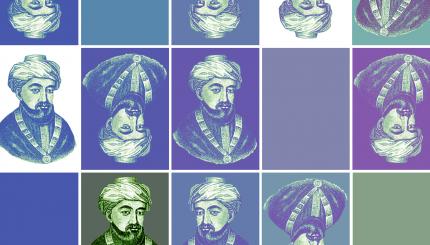The author has earlier contrasted “the theology of the physicist,” which focuses on the order in the universe, with “the theology of the naturalist,” which pays particular attention to the vast variety of the universe. Here, he explains what is missing from “the theology of the physicist”–“namely, what is the relationship between that Creator and that universe which was created?” The following midrash, a story interpreting the text, serves as the basis of the entire discussion. Reprinted from Finding Our Way, published by Jewish Publication Society.
The Lord said to Abram: Go forth from your native land and from your father’s house to the land that I will show you. (Genesis 12:1)
Rabbi Isaac said: This may be compared to a man who was traveling from place to place when he saw a castle in flames. “Is it possible that the castle lacks a person to look after it?” he wondered. The master of the castle looked out and said, “I am the master of the castle.” Similarly, because Abraham our father said, “Is it conceivable that there is none to look after the world?” The Holy One, blessed be He, looked out and said to him, “I am the Master, the Sovereign of the Universe.” (Genesis Rabbah 39:1)
If we look once again at our midrash, we notice that the insight that Abraham gains is not that there is a builder (although of course there are numerous Jewish texts that do assert such a view) — for him that was an obvious point. Rather, Abraham’s question was “Is it conceivable that there is none to look after the world?” In other words, is there an ongoing role for God in history?

Help us keep Jewish knowledge accessible to millions of people around the world.
Your donation to My Jewish Learning fuels endless journeys of Jewish discovery. With your help, My Jewish Learning can continue to provide nonstop opportunities for learning, connection and growth.
After the act of creation (“the first three minutes,” as we might say) does God, in Abraham’s view, remain involved in the life of the world? Especially, if we follow the metaphor of the midrash, when we look out on a world that often appears to be “in flames.” Indeed, if we press the parable of that midrash a little bit further, we can ask if there might not be a deeper set of questions underneath it: If the universe is in flames, whey doesn’t the Master do something about it? How does the fire “prove” that there is a Master? It might in fact prove the opposite — that the world has no one to put out the flames!
And more than that, the physicists’ God presents another problem as well. It seems to me that a position about the nature of God has to make some sense in the light of people’s day-to-day lives. It has to speak to the concerns of normal existence and not only to our occasional speculations about the origins of the universe. Thus, does the existence of the physicists’ God help us in any way to understand the experience of the holy in our own personal lives? The God of the first three minutes seems very far away from my own existence, and though I may find some comfort in believing that the cosmos is a well-ordered creation, it does not seem to answer “the hunger for wonders,” the inner needs in a person’s own life that religion has always been able to address.
In that regard, the naturalists’ God, the God of the many and varied species, seems to work somewhat better. I myself remember visiting the aquarium in Eilat at the southern tip of Israel and seeing the astonishing variety of tropical fish swimming in those tanks — fish in the shape of boxes, fish that looked like lions, fish that appeared to have been painted by Picasso — and without consciously planning it, the words of Psalm 92, “How great are your works, O Lord,” came out of my mouth.
I suspect that if we lived less of our lives in urban settings, this religious perspective might speak to us with even greater power. Indeed, it’s likely that some of the fervor behind contemporary ecological concerns, as well as the interest people find in exploring the natural world though camping and hiking and wilderness programs like Outward Bound, may emanate from a secularized version of these deeper religious impulses.
What I do find compelling in the views of the physicists and the naturalists is that they both begin with a sense of mystery, and it is there that my earlier question about the personal dimension of religious experience begins to crystallize. For mystery is not only a matter of rational speculation about the origins of the universe or the variety of natural life, it is also a perception that is able to touch any of us at any moment. It is the sense that behind the natural world we deal with every day is a realm of the unknown, the unexplainable, that every once in a while will startle us into awareness, if even for an instant.


